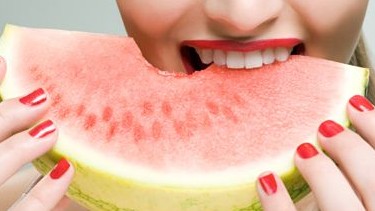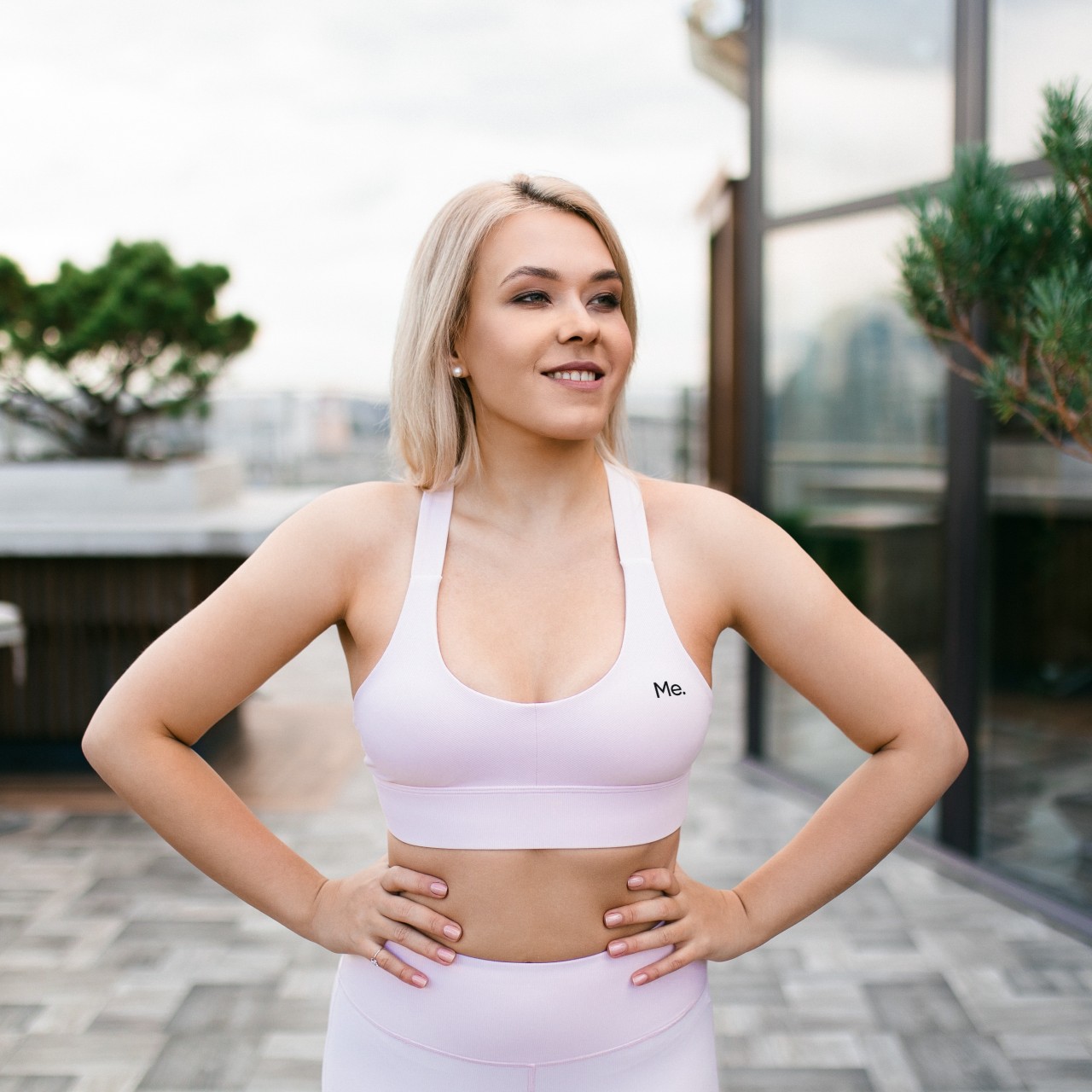3 Surprising Facts About Water
Forget the eight glasses a day. The key to a healthier, slimmer, younger you is all about eating water-based foods.For water-rich recipes to help you look and feel 10 years younger, visit TheWaterSecretBook.com, and take this quiz for more personalized tips!

MYTH 1: Exercise causes dehydration.
When Kate L. crossed the finish line in an October 2009 triathlon, she knew she'd clinched a personal record. The chip around her ankle clocked her at two hours, 49 minutes, and 18 seconds, which meant she placed fourth in her 30-to-35-year-old age group. She felt fantastic and reported that it was the first time she'd ever not taken more than a few sips of water during the entire race. As she breezed past dozens of other competitors during the run, she saw many struggling to move one foot in front of the other as they reached for water bottles strapped to their waist or accepted handouts at water stations.
While it's hard to say what exactly propelled Kate across the finish line quicker than in events past, she did have an edge over others in the hydration department. In the months leading up to the race, she had been bathing her body's cells in the nutrients they needed to remain strong and hydrated. She had come to redefine what it meant to be fit.
The advantages of being fit are plentiful, but an advantage that's rarely mentioned is hydration. In the lab, you'll find that people who maintain a regular exercise program — even just a minimal routine like power walking a few times a week — are able to stay hydrated much more easily than a sedentary person. Why? Muscle holds more water than fat does, which also explains why bioelectrical pulses sent through a body to measure its composition move quickly through people who carry more muscle than fat.
The lesson: The more muscle you have, the better your chance of holding on to cellular water. Exercise ultimately fosters hydration; the fitter you are, the less water you need to drink.
FAT FACT: Every year after age 25, we gain, on average, one pound of body weight and lose a third to a half pound of muscle.
Myth 2: You need eight glasses of water a day.
Stay In The Know
Get exclusive access to fashion and beauty trends, hot-off-the-press celebrity news, and more.
When our cells are not fully hydrated, they deteriorate and can't function at their peak level. This leads to the tissue damage we refer to as aging. As we age, we naturally lose water, and it's this water loss that makes it harder for our bodies to heal, scavenge for free radicals, defend against invading bacteria and pathogens, and keep the effects of hormonal imbalance in check. But here's the catch: simply drinking up won't replenish your healing waters.
The trick is getting water into the cells and connective tissue and keeping it there so that every cell can function at its full capacity. If we can't keep the water in our cells, we'll be heading to the bathroom eight, 10, or 20 times a day. Like a perforated pocket trying to hold coins, the water seeps out and becomes wasted water — the kind that shows up as swollen legs and ankles, puffy eyes, and allover bloating.
To replenish moisture, eating water is better than drinking it. The main ingredient in fruits and vegetables is water, and this liquid is surrounded by molecules that help it get into cells easily and quickly. Watermelon and cucumbers, for example, are 97 percent water; tomatoes and zucchini are 95 percent. One slice of whole-wheat bread is about a third water, and a tortilla somewhat more. A roasted chicken breast is 65 percent water, baked salmon 62 percent, and even cheeses such as blue and cheddar are about 40 percent water. Beans, grains, and pasta act like sponges when you cook them, which is why a cup of boiled red kidney beans is 77 percent water. (However, raw vegetables are still more healthful.) Try eating more water-rich foods, and you'll feel more energized after 10 days, see plumper, brighter skin in four weeks, and have a leaner, more hydrated body after 10 weeks.
FAT FACT: Fat tissue is about 10 to 20 percent water, while lean tissue (which includes muscle and bone) averages 70 to 75 percent—that's why muscle weighs more than fat.
Myth 3: All fat is created equal.
Every year after age 25, we gain, on average, one pound of body weight and lose a third to a half pound of muscle. As a result, our resting metabolism decreases about 0.5 percent annually.
The unhealthy fat that collects around the waistline is often referred to as visceral fat because it surrounds the "viscera" — vital organs such as the heart, liver, and lungs. Instead of burning calories, like muscle does, this abdominal fat releases chemicals that negatively affect your metabolism, generating hormones that can cause weight gain while preventing the production of healthy substances that can lead to weight loss.
Visceral fat is an age-maker — it wreaks havoc on the liver and has been linked to heart disease, diabetes, some forms of cancer, and a cluster of risk factors called metabolic syndrome, which increases the chance of developing these diseases. And it's not a problem just for overweight or obese people. While abdominal fat is usually visible, visceral fat can be hidden deep inside an outwardly thin person. The same holds true for fat that can line blood vessels, restrict blood flow, and damage the cardiovascular system. To know if visceral fat is a problem, we can measure our waists: Women's waistlines should not be greater than 35 inches or have a waist-to-hip ratio (waist measurement divided by hip measurement) greater than 0.85.
Luckily, visceral fat literally melts away when we control calories and get our bodies moving. If you want to burn fat, it must be broken down and used for energy. Water is the best vehicle for transporting fat, which makes hydration even more important. If the water in your blood drops below normal levels, water will be pulled from your muscles to support the amount necessary in the blood. When this happens, dehydration occurs. The most fat a person can lose in a week is roughly three pounds. If you lose more than that, it's most likely water loss.
People who go to extremes to lose weight quickly often impair their fat metabolism by cutting too far back on calories, which forces the body into starvation mode. When this happens, the body holds on tightly to fat and burns up muscle tissue for energy.
And while it's true that in theory a calorie is a calorie, the body responds differently to the source of calories. Eating a candy bar that is loaded with refined sugar and unhealthy fat will cause a spike in insulin, which triggers storage of those calories in fat cells. Eating a turkey sandwich on whole grain with bell peppers, sprouts, and avocado, on the other hand, doesn't cause a spike and requires time and an expenditure of energy to break down its proteins, healthy fats, and complex carbohydrates. The sandwich will keep your energy balanced, support your muscles, and hydrate—rather than dehydrate—you.
Dr. Howard Murad is a dermatologist, pharmacist, and clinical professor of medicine at UCLA. He's also the founder of Murad Skincare. The Water Secret (John Wiley & Sons, Inc.) hits stores this month.
-
 Meghan Shares Photos of Archie and Lilibet's Vibrant Red Hair
Meghan Shares Photos of Archie and Lilibet's Vibrant Red HairThe little royals most definitely take after dad Prince Harry.
By Amy Mackelden
-
 Former Royal Nanny Opens Up About George, Charlotte, and Louis
Former Royal Nanny Opens Up About George, Charlotte, and Louis"You see how grounded they really are."
By Amy Mackelden
-
 Travis Kelce Emerges in Las Vegas Without Taylor Swift
Travis Kelce Emerges in Las Vegas Without Taylor SwiftThe "Blank Space" singer was nowhere to be seen.
By Amy Mackelden
-
 There's a Huge Gap in Women's Healthcare Research—Perelel Wants to Change That
There's a Huge Gap in Women's Healthcare Research—Perelel Wants to Change ThatThe vitamin company has pledged $10 million to help close the research gap, and they joined us at Power Play to talk about it.
By Nayiri Mampourian
-
 BetterMe Will Make Your New Year’s Resolutions Last the Other 12 Months
BetterMe Will Make Your New Year’s Resolutions Last the Other 12 MonthsSponsored BetterMe: Health Coaching uses a psychology-based program to approach your health goals from all angles, so they stay within reach.
By Sponsored
-
 Everlywell's At-Home Test Kits Are 40% Off
Everlywell's At-Home Test Kits Are 40% OffThe testing company is offering big savings on some of their most popular kits.
By The Editors
-
 Senator Klobuchar: "Early Detection Saves Lives. It Saved Mine"
Senator Klobuchar: "Early Detection Saves Lives. It Saved Mine"Senator and breast cancer survivor Amy Klobuchar is encouraging women not to put off preventative care any longer.
By Senator Amy Klobuchar
-
 I'm an Egg Donor. Why Was It So Difficult for Me to Tell People That?
I'm an Egg Donor. Why Was It So Difficult for Me to Tell People That?Much like abortion, surrogacy, and IVF, becoming an egg donor was a reproductive choice that felt unfit for society’s standards of womanhood.
By Lauryn Chamberlain
-
 The 20 Best Probiotics to Keep Your Gut in Check
The 20 Best Probiotics to Keep Your Gut in CheckGut health = wealth.
By Julia Marzovilla
-
 Simone Biles Is Out of the Team Final at the Tokyo Olympics
Simone Biles Is Out of the Team Final at the Tokyo OlympicsShe withdrew from the event due to a medical issue, according to USA Gymnastics.
By Rachel Epstein
-
 The Truth About Thigh Gaps
The Truth About Thigh GapsWe're going to need you to stop right there.
By Kenny Thapoung